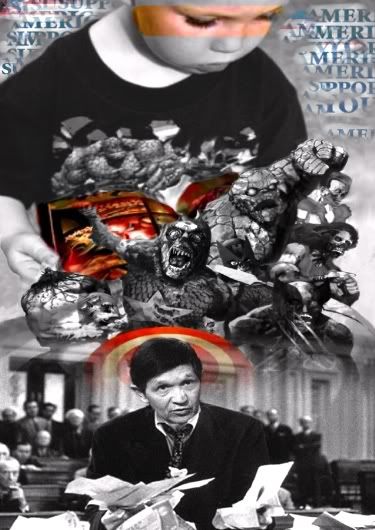 "There are things all around. Things you never see because you don't have the words, you don't have the names. you only learned the 26-letter alphabet.
"There are things all around. Things you never see because you don't have the words, you don't have the names. you only learned the 26-letter alphabet.
"Here are some names for things...." - Grant Morrison, The InvisiblesSpeaking the WorldThere are only, maybe, 350 members of the Pirahã tribe, but its language is
confounding linguists for all that it lacks. There are no subordinate clauses and no past tense; no words for colours and hardly any for time. The language contains no numbers.
The debate amongst linguists about the absence of all numbers in the Pirahã language broke out after Peter Gordon, a psycholinguist at New York's Columbia University, visited the Pirahãs and tested their mathematical abilities. For example, they were asked to repeat patterns created with between one and 10 small batteries. Or they were to remember whether Gordon had placed three or eight nuts in a can.
The results, published in Science magazine, were astonishing. The Pirahãs simply don't get the concept of numbers. His study, Gordon says, shows that "a people without terms for numbers doesn't develop the ability to determine exact numbers."
Gordon's work revived interest in the
Sapir-Whorf hypothesis of linguistic determinism: that our language sculpts the way we think about the world, and that without a word for something, we can't think of it. This is the premise of Orwell's Newspeak: to greatly reduce the vocabulary by stripping it of words and constructs which could describe rebellion and even an alternative to Big Brother, in order that it become impossible to even think of such things.
Linguist Daniel Everett, who spent seven years living with the Pirahãs and says "their thinking isn't any slower than the average college freshman," devoted eight months trying to teach them simple Portuguese numbers used by Brazillians, but "in the end, not a single person could count to ten." In Gordon's
Science article "Numerical Cognition Without Words: Evidence From Amazonia" he asks, "Is there any case where not having words for something doesn't allow you to think about it?" And then answers, "I think this is a case for just that."
Clifford Pickover in
Sex, Drugs, Einstein, & Elves reflects upon vocabulary's role in shaping his world when he studied entomology, and learned insect orders and names for body parts:
When I had names for everything, I perceived insects so differently, remembered insects so differently, and communicated about insects so differently. The names helped focus and consolidate my attention in strikingly new ways. Certainly, before I knew the names, I could see that one bug had large wings and another did not, or one had a hypognathous jaw and another did not, but I doubt that my mind was tuned to manage, compartmentalize, and take note of this new information. Before I knew the words, did I wonder why the insects were different or did I just accept that a bug is a bug?"Need to Know"Boundary experiences are so-called in part because they transgress the boundary of our ability to describe them. They transcend concepts which can be accommodated by our language, and even introduce a new language that cannot be wholly translated back into our native tongues once the experience ends.
DMT may
introduce "three dimensional 'glyphs' of pure meaning which defy my every attempt to describe them." Terence McKenna
regarded these encountered objects as a "new dispensation of the logos. They are holding out the possibility that language need not be processed by the ears, that language can become, under certain radical situations of neurological perturbation, visible." And with
some frequency, the DMT experience includes failed attempts at communication and instruction by encountered entities. ("The two beings seemed to be trying to attract my attention, and to communicate something to me, but I could not understand. It was as if they were trying to make me understand where I was.")
UFO contactees also often have difficulty finding words, post-encounter, to accurately describe experiences which occurred out of their familiar time and space and sometimes with no seeming reference to their own language. They may be shown texts of strange symbols, the meaning of which is evident in the moment but afterwords, attempting to reconstruct the event in their natural syntax, the symbols are entirely foreign and beyond translation.
Dr Mario Pazzaglini authored a 16-year study of "received" text entitled
Symbolic Messages, He
told Greg Bishop that the symbols "are so spatial
that they transmit tremendous amounts of information at one blast":
And you may not always be able to relay that information back as a reported word, but as an internal experience, it's pretty rich. So if the symbols continue in that vein, they'll be very valuable. We are well built for that, because biologically we have this system called "entrainment." If you and I are talking, we just look at each other and there's tremendous amounts of information passed besides what's passed verbally. So you have some feelings about me, I may have some about you, and you may at some point visualize what you think I am, which will encode information about me (not necessarily what I look like) and all that stuff is going on. So that's what might be the value of these symbols - that they're not trying to communicate to us (if that's what they are doing) the particular thing that the symbol is supposed to be saying, but there's a whole downloading of experience and possibility that is going on that we're not even aware of yet. Certainly the culture is different for this phenomena existing."Almost overnight,"
just 50,000 years ago, anatomically modern humans began acting differently, by demonstrating abstract thought in the creation of art and religion. People were talking, not just communicating by gesture and intonation, and things had names. Categories were being defined and ideas were shaping words, filling our ancestors' heads and animating their lives. And now, 2,000 generations later, are our vocabularies rich enough to paint in abstract the real world? Or have we lost or abandoned concepts along the way, as
Oldspeak, that could help us see that which may be all about us, but for which we have no meaningful words, and so can't see?
When Tim Russert attempted to
dispatch the candidacy of Dennis Kucinich with a question regarding his close encounter, Kucinich replied "It was an Unidenfied Flying Object, okay? It's unidentified - I saw
something." Except "UFO" is not a contentless placeholder. UFO
is identified with little green men, ET and Mars Attacks. There is no meaningful way to speak about the subject in the English language without reference to its debased and comic acronym, and if language shapes our view of reality, then it may take an effort of will or a boundary experience of our own to see that there is more to the phenomenon than a punchline.
Having the wrong word may be even more a hindrance to our perception of reality than not having a word at all. And that misperception, about UFOs and much else, is almost certainly managed to some measure to keep our vision blurry.
Budd Hopkins
shared a story in 2003 about the late UFOlogist Allen Hynek, who got to know Donald Rumsfeld when Rumsfeld was Secretary of Defense under Gerald Ford. On one visit to Washington, Hynek met Rumsfeld in his office and said, "I have been in this for years looking at the UFO phenomena. I feel like at this point in my life I am in a position of 'need to know' what you know or what some agency might know that I don’t know. I have a 'need to know' I feel." Hopkins said that Hynek told him "Rumsfeld stood up and pointed a finger at him and said, "You have no 'need to know' and then sat down again. That was the end of it."
There are a lot of things we can't know with certainty about that story, not least of which is whether it actually even happened. But we can know that for some things we don't know their true names, and until we do we won't know them, or even see them.




